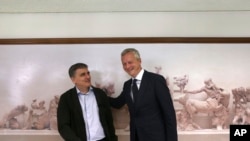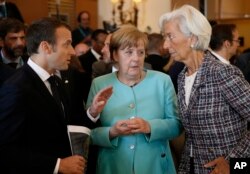Eurozone finance ministers and the International Monetary Fund are likely to strike a compromise on Greece on Thursday, paving the way for new loans for Athens while leaving the contentious debt relief issue for later, officials said on Monday.
IMF head Christine Lagarde suggested a plan last week under which the Fund would join the Greek bailout now, because Athens is delivering on agreed reforms, but would not disburse any IMF money until the eurozone clarifies what debt relief it can offer Greece.
Underlining the IMF's willingness to strike a deal after months of wrangling between its European chief Poul Thomsen and the eurozone, Lagarde will attend the ministers' meeting.
IMF participation in the bailout, even without immediate disbursements, would be enough for the German parliament to back new euro zone loans to Athens, thus ensuring Greece would get enough cash in July to repay maturing debt and avoid default.
“Everyone thinks there is a high probability we will end up with the solution Lagarde outlined,” an official involved in preparations for Thursday's meeting in Luxembourg said.
Reforms approved Friday
A second official involved in the preparations also said he expected a deal involving IMF participation along the lines described by Lagarde.
“There would be an IMF disbursement as soon as there is more clarity on debt, but the timing of that is to be confirmed,” the second official said.
Greece's parliament approved last Friday reforms demanded by the international lenders to conclude a long-stalled review of its bailout progress and qualify for more loans before July.
Eurozone officials said that if the expected compromise is reached, Greece could get between 7.4 and 8 billion euros from the eurozone bailout fund ESM to cover next month's repayments.
IMF support on hold
The IMF has so far refused to join Greece's bailout, its third since 2010, which it says must be the country's last, meaning that in addition to Athens making reforms, the eurozone must offer relief to help make Greece's debts sustainable.
But Berlin does not want to discuss any details of debt relief for Greece before German parliamentary elections in September. At the same time, the German parliament has asked for IMF participation if it is to agree to any new disbursements.
To complicate matters further, the IMF and the eurozone differ substantially on forecasts for Greek growth for decades ahead and on Athens' ability to achieve high primary surpluses to help it service its debt.
Debt relief plan
The IMF is much more conservative than the euro zone, saying Greece has a track record of underperforming targets set in its bailouts. It says that to expect the country to keep a high primary surplus for decades is unrealistic.
But some eurozone scenarios show that with sufficiently high economic growth and fiscal discipline — a primary surplus above 3 percent of GDP for 20 years — Greece would not need any extra debt relief.
To bridge the gap, France is proposing to link debt relief to Greece's GDP growth with an automatic formula. Officials said experts would explore that option further, but its chances of success are seen as rather low because of lack of experience, problems with incentives and the Greek constitution.







